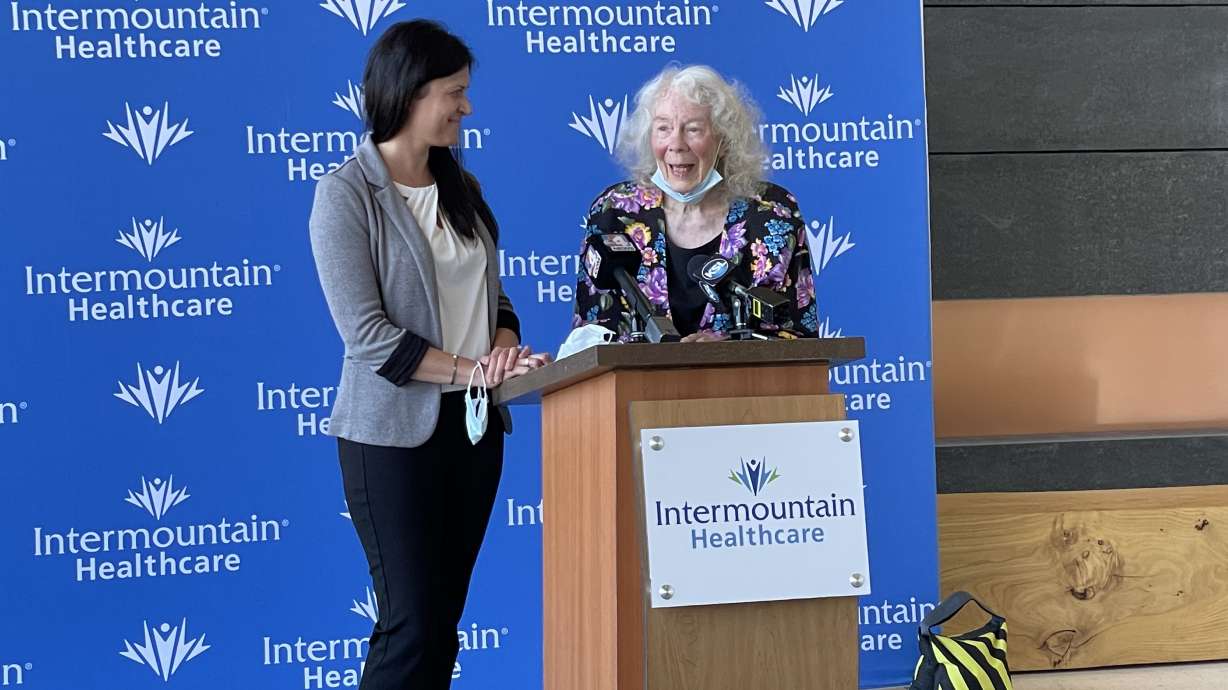Estimated read time: 4-5 minutes
This archived news story is available only for your personal, non-commercial use. Information in the story may be outdated or superseded by additional information. Reading or replaying the story in its archived form does not constitute a republication of the story.
MURRAY — When Loraine Jensen's legs started swelling at the end of 2020, she feared she might be going through the same thing her husband experienced several years earlier before he passed away.
"My left leg was almost double," she said on Tuesday. "My feet would hurt, and I'd wake up in the middle of the night in pain."
But medical treatments for people with a heart condition like Jensen's have undergone technological improvements since her husband's illness.
Aortic stenosis causes the aortic valve — which is where blood exits the heart — to stop opening, said Dr. Edward Miner, a cardiologist at Intermountain Medical Center. The condition is often diagnosed in patients with a heart murmur.
When she gave birth to each of her nine children, Jensen remembered doctors pointing out that she had a heart murmur. But she says it got worse through the years.
"And some people think it's nothing to worry about, but eventually that murmur can become a very serious and even life-threatening problem. When the valve fails to open completely, that leads to heart failure, fluid retention, and can lead to death," Miner said.
For decades, doctors have successfully treated the condition with open heart surgery, which includes removing the original valve and sewing in a replacement valve.
Intermountain Medical Center, however, pioneered a new treatment called transcatheter aortic valve replacement in 2009. During the procedure, a doctor inserts a new, special valve without the need for open heart surgery. The valve is about 1 inch in diameter and can be sewn in with surgery, or it can go through a small tube inserted in the femoral artery, according to Miner.
Aortic stenosis often occurs in elderly patients who aren't ideal candidates for open heart surgery, Miner noted. Now, more than 2,000 patients in Utah have received the treatment since Intermountain Healthcare became the first hospital system in the Intermountain West to offer it.
Jensen became the 2,021st patient of Intermountain's in late May. Intermountain Medical Center celebrated her on Monday by sharing her story and awarding her a heart-shaped plaque.
Miner said patients face a lower risk of complication compared to open heart surgery and "feel better" soon after the procedure.
"And the risk of hospitalization and heart failure is avoided," Miner said.
The special valves are more expensive than the valves that are put in during open heart surgery, Miner said, but ultimately lead to cost savings.
"Where the hospitalization is shorter, less days in the hospital, less risk of having to recover in a rehab facility, and for many patients going back to work sooner is a cost savings," he said. "So the total cost to our society and health care system is favorable with transcatheter valves, even though the valve itself is more expensive than a surgical valve."
Dr. Kirk Knowlton, director of cardiovascular research at Intermountain, said the implementation and design of the catheter "is one of the greatest innovations of the last 10 to 15 years in cardiovascular medicine."
"Many of you probably have neighbors, I have one who came to me and said, 'I got a valve put in. I can think again, I can climb stairs again.' Many of you probably know people in similar situations," Knowlton said.
After receiving the treatment at the end of May, Jensen said she already feels much better.
"Now I wake up in the middle of the night, but it's not from this pain," she quipped.
"I wake up now, and I can get out of bed, and I don't have pain in my legs, and my legs are much better. I can go up the stairs. I have seven to go up to my bedroom and seven to go down to my washing machine room. And I can go down those holding on to a railing, but I can breathe so much better," she said.
"It's a miracle, I think. It's just amazing all of the things that the doctors have been able to do," Jensen said.
Her husband had coronary bypass surgery in 2000 and needed to recover in the hospital for more than two weeks.
"I was in the hospital, I could have come home probably after two days, but I stayed three because I was going to go home and be by myself, and they wanted to make sure I was fine," Jensen said. "My husband's surgery and this is just like two different worlds."
She noted that the treatment has also helped her feel better mentally.
In addition to her nine children, Jensen has 35 grandchildren and 27 great-grandchildren.
"And hopefully I can live a few more years to see more great-grandchildren born," she said.









